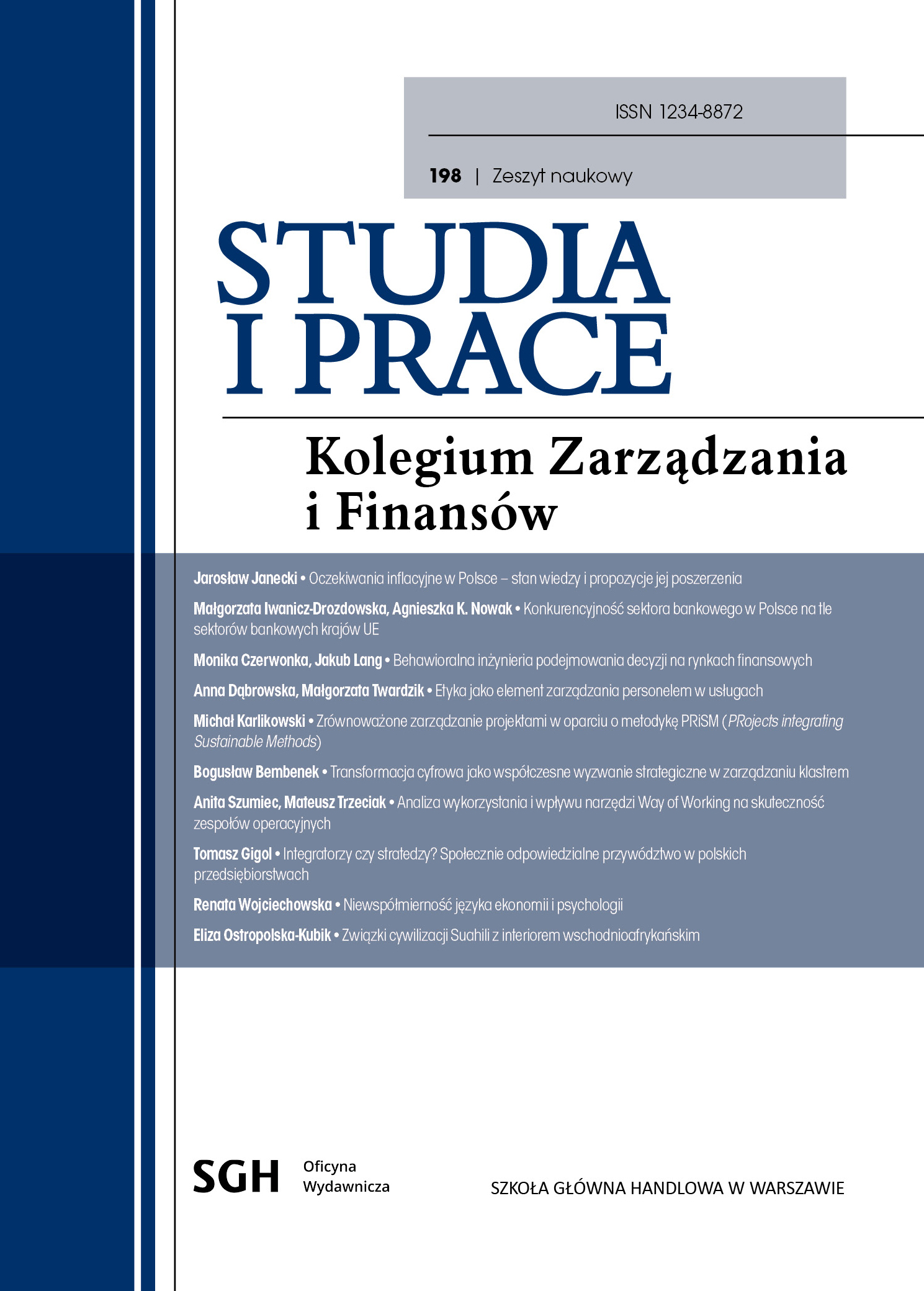Sustainable project management based on the PRiSM method
DOI:
https://doi.org/10.33119/SIP.2024.198.5Keywords:
project management, sustainable project management, project management methodsAbstract
The sustainable approach to project management is a necessity in today’s world. Climate crisis, demographic and economic changes press organizations to implement sustainable development goals in their activities. The project management area cannot be isolated from these changes, therefore, adaptations of sustainable development goals must be developed in project management practice as well. The aim of this article is to identify the adaptations of sustainable development goals in the main methods of project management, including the Projects integrating Sustainable Methods (PRiSM). The article seeks to answer the questions in what aspect the PRiSM method differs from the approaches used so far and whether the elements of sustainable development can be found in global standards of project management. The primary research method in this study is the analysis of scientific publications (monographs, studies, and scholarly articles, a literature review and a critical analysis of this literature) dedicated to the examined issue, including both national and international as well as global methodological guidelines in the area of project management.
Downloads
References
Wydawnictwa zwarte
Carboni, J., Duncan, W., Gonzalez, M., Milsom, P., Young, M. (2020). Zrównoważone zarządzanie projektami: podręcznik GPM. Kraków: pm2pm.
GPM Global (2019). GPM Standard P5 na Rzecz Zrównoważonego Zarządzania Projektami. Warszawa: GPM Global.
Hauff, V. (ed.) (1987). Our common future, WCED World Commission on Environment and Development, WCED/87/6, s. 1–87.
IISD (1994). Earth Enterprise Tool Kit. Winnipeg: International Institute for Sustainable Development. 94 Michał Karlikowski
IPMA ICB 4.0 (2016). International Project Management Association – International Competence Baseline (ICB) 4.0.
Rogall, H. (2010). Ekonomia Zrównoważonego Rozwoju. Teoria i praktyka. Poznań: Zysk i S-ka.
Artykuły naukowe
Ćwikła, M. (2023). Zrównoważone zarządzanie projektami. Krytyczny przegląd literatury, Prace Naukowe Uniwersytetu Ekonomicznego we Wrocławiu, 67 (5), s. 87–100.
Fonseca, L. M., Domingues, J. P., Dima, A. M. (2020). Mapping the Sustainable Development Goals Relationships, Sustainability, 12 (8), s. 1–15.
Guida, P. L., Monassi, M. (2021). The New ISO 21502, PM World Journal, 10 (3), s. 1–15.
Hirvilammi, T. (2020). The Virtuous Circle of Sustainable Welfare as a Transformative Policy Idea, Sustainability, 12 (1), s. 2–15.
Hirvilammi, T., Koch, M. (2020). Sustainable Welfare beyond Growth, Sustainability, 12 (5), s. 1–8.
Huemann, M., Silvius, G. (2017). Projects to Create the Future: Managing Projects Meets Sustainable Development, International Journal of Project Management, 35 (6), s. 1066–1070.
Juchniewicz, M. (2021). Społecznie odpowiedzialne zarządzanie projektami – propozycja modelu dojrzałości, Przegląd Organizacji, 11 (982), s. 29.
Kolltveit, B. J., Karlsen, J. T., Grønhaug, K. (2007). Perspectives on Project Management, International Journal of Project Management, 25 (1), s. 3–9.
Kołoszycz, E., Wilczyński, A. (2023). Integracja zasad zrównoważonego rozwoju w zarządzaniu projektami, Zeszyty Naukowe Polskiego Towarzystwa Ekonomicznego w Zielonej Górze, 18 (3), s. 57.
Lieder, M., Rashid, A. (2016). Towards Circular Economy Implementation: a Comprehensive Review in Context of Manufacturing Industry, Journal of Cleaner Production, 115 (2), s. 36–51.
Lozano, R. (2007). Orchestrating Organisational Changes for Corporate Sustainability: Overcoming Barriers to Change, Greener Management International, 57, s. 43–64.
Madureira, R. C., Silva, C. S., Amorim, M., Dias, M. F., Lins, B., Mello, G. (2022). Think Twice to Achieve a Sustainable Project Management: From Ecological Sustainability towards the Sustainable Project Management Cube Model, Sustainability, 14 (6), s. 34–36.
Marcelino-Sadaba, S., Gonzalez-Jaen, L. F., Perez-Ezcurdia, A. (2015). Using Project Management as a Way to Sustainability. From a Comprehensive Review to a Framework Definition, Journal of Cleaner Production, 99 (1), s. 1–16.
Purvis, B., Mao, Y., Robinson, D. (2019). Three Pillars of Sustainability: In Search of Conceptual Origins, Sustainability Science, 14 (3), s. 681–695.
Silvius, G., Schipper, R. (2014). Sustainability in Project Management: A Literature Review and Impact Analysis, Social Business, 4 (1), s. 63–96.
Söderlund, J. (2002). On the Development of Project Management Research: Schools of Thought and Critique, International Project Management Journal, 6 (1), s. 20–31.
Tam, G. (2010). The Program Management Process with Sustainability Considerations, Journal of Project, Program Portfolio Management, 1 (1), s. 17–27.
Turner, J. R., Anbari, F., Bredillet, C. (2013). Perspectives on Research in Project Management: the Nine Schools, Global Business Perspectives, 1 (1), s. 3–28.
Downloads
Published
How to Cite
Issue
Section
License
Copyright (c) 2024 Studies and Work of the Collegium of Management and Finance

This work is licensed under a Creative Commons Attribution 4.0 International License.









